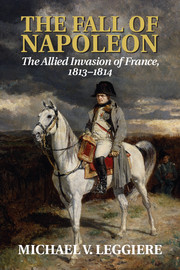Book contents
- Frontmatter
- Dedication
- Contents
- List of Illustrations
- Preface
- 1 The New Charlemagne
- 2 Barbarians at the Gate
- 3 The Frankfurt Proposals
- 4 Napoleon and the French
- 5 The Left Bank
- 6 The Right Bank
- 7 The Lower Rhine
- 8 The Upper Rhine
- 9 The Middle Rhine
- 10 Alsace and Franche-Comté
- 11 The Vosges and the Saône
- 12 Lorraine
- 13 The Saar and the Moselle
- 14 Belgium
- 15 The Marne
- 16 Bourgogne, the Rhône, and the Aube
- 17 The Protocols of Langres
- Appendices
- Bibliography
- Notes
- Index
14 - Belgium
Published online by Cambridge University Press: 05 February 2015
- Frontmatter
- Dedication
- Contents
- List of Illustrations
- Preface
- 1 The New Charlemagne
- 2 Barbarians at the Gate
- 3 The Frankfurt Proposals
- 4 Napoleon and the French
- 5 The Left Bank
- 6 The Right Bank
- 7 The Lower Rhine
- 8 The Upper Rhine
- 9 The Middle Rhine
- 10 Alsace and Franche-Comté
- 11 The Vosges and the Saône
- 12 Lorraine
- 13 The Saar and the Moselle
- 14 Belgium
- 15 The Marne
- 16 Bourgogne, the Rhône, and the Aube
- 17 The Protocols of Langres
- Appendices
- Bibliography
- Notes
- Index
Summary
In late November, the Prussians invaded French-controlled Holland seeking to gain the credit and reward for liberating the Low Countries. Bülow, Boyen, and Gneisenau recognized the military and political advantages of driving through the Low Countries to threaten France's northern frontier and ultimately the flank of Napoleon's army. Yet strategic consumption and Bülow's entanglement among the Dutch forts fulfilled Napoleon's expectations. Inadequate manpower and harsh winter conditions impeded Bülow's progress. Desperate to secure assistance, the Prussian general looked to the other Allied units operating in the northern theater. With Wintzingerode's corps the closest, Bülow expected support, but the Russian commander refused. Fortunately for the Coalition, Bülow developed an excellent working relationship with Graham. The cooperative attitude of the two Allied generals is noteworthy. Despite supply problems, inadequate combat power, and hostile weather, both commanders maintained a concerted, professional, and sensible approach to their related tasks, even if Graham's attitude reflected London's obsession with Antwerp.
Aside from the sluggish nature of Bülow's operations, his presence in the Low Countries created diplomatic opportunities for Prussia. The British had been interested in taking Antwerp since November. “The destruction of that arsenal is essential to our safety,” wrote Castlereagh. “To leave it in the hands of France is little short of imposing upon Great Britain the charge of a perpetual war establishment.” Castlereagh informed Hardenberg that Prussia would earn London's full gratitude if Bülow's troops captured Antwerp.
- Type
- Chapter
- Information
- The Fall of Napoleon , pp. 406 - 442Publisher: Cambridge University PressPrint publication year: 2007

